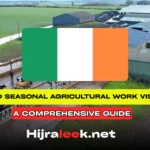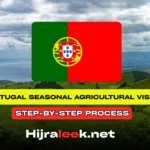The Italy Farm Work Visa 2025 is a remarkable opportunity for non-EU workers seeking seasonal employment in Italy’s thriving agricultural sector. Through the Decreto Flussi, Italy’s annual immigration quota system, thousands of workers from around the world can secure legal work permits to contribute to the country’s agricultural needs. This comprehensive guide explores every aspect of the Italy Farm Work Visa 2025, including eligibility criteria, application process, benefits, key dates, and answers to frequently asked questions to help you navigate this opportunity successfully.
Understanding the Italy Farm Work Visa 2025
The Italy Farm Work Visa is a seasonal work permit issued under the Decreto Flussi, a government-regulated program designed to address Italy’s labor shortages by allowing non-EU nationals to work temporarily in specific sectors, including agriculture. For 2025, the program is expected to allocate a significant number of visas for farm workers, enabling them to engage in activities such as planting, harvesting, and processing crops like olives, grapes, tomatoes, and citrus fruits. This visa typically allows workers to stay in Italy for up to nine months, offering a unique chance to earn a stable income while experiencing life in one of Europe’s most culturally rich countries.
Italy’s agricultural sector is a cornerstone of its economy, contributing significantly to its GDP and global exports of high-quality produce, such as wine, olive oil, and fresh fruits. The demand for seasonal workers is particularly high in regions like Tuscany, Sicily, and Puglia, where labor-intensive farming activities peak during specific seasons. The Decreto Flussi facilitates the legal entry of workers from countries with bilateral agreements with Italy, ensuring a streamlined process for both employers and employees.
For those interested in exploring job opportunities, platforms like Hijraleek provide a reliable starting point to connect with verified Italian employers in the agricultural sector.
Eligibility Criteria for the Italy Farm Work Visa 2025
To apply for the Italy Farm Work Visa 2025, applicants must meet specific requirements set by the Italian government. These criteria ensure that only qualified individuals are granted access to this seasonal work program. Below are the key eligibility requirements:
- Non-EU Citizenship: The visa is exclusively for nationals of non-European Union countries that have bilateral agreements with Italy. Common eligible countries include Morocco, Tunisia, India, Pakistan, and others specified in the Decreto Flussi announcements.
- Valid Job Offer: Applicants must secure a job offer or contract from an Italian employer in the agricultural sector. This is a critical step, as the employer initiates the work permit process.
- Minimum Age: Applicants must be at least 18 years old at the time of application.
- Health and Background Checks: A clean criminal record and proof of good health may be required, depending on the Italian embassy or consulate processing the application.
- Valid Passport: A passport valid for at least six months beyond the intended stay in Italy is mandatory.
- Financial Stability: Some applicants may need to demonstrate sufficient funds to support themselves during their stay, although this requirement is often waived if the job contract guarantees accommodation and wages.
For a complete list of eligible countries and detailed requirements, visit the official Italian Ministry of the Interior website.
Step-by-Step Application Process for the Italy Farm Work Visa
Applying for the Italy Farm Work Visa under the Decreto Flussi requires careful planning and adherence to deadlines. The process involves coordination between the worker, the employer, and Italian authorities. Below is a detailed guide to the application process:
- Find a Job Offer: The first step is to secure a job offer from an Italian employer in the agricultural sector. Platforms like Hijraleek can connect you with verified employers offering seasonal farm work. Ensure the job offer includes details about the role, duration, and salary.
- Employer Applies for Nulla Osta: The Italian employer submits a work permit request, known as the Nulla Osta, through the Italian government’s online portal during the Decreto Flussi application window. This step is critical, as the Nulla Osta is the employer’s authorization to hire a non-EU worker.
- Wait for Nulla Osta Approval: Once submitted, the Italian authorities review the application. If approved, the Nulla Osta is issued, typically within 30–60 days, depending on the volume of applications.
- Apply for the Visa: After receiving the Nulla Osta, the worker applies for the seasonal work visa at the Italian embassy or consulate in their home country. Required documents include:
- A valid passport
- The approved Nulla Osta
- A signed job contract
- Proof of accommodation in Italy (often provided by the employer)
- Health insurance covering the duration of the stay
- Recent passport-sized photographs
- Visa application form
- Attend an Interview (if required): Some embassies may require an interview to verify the applicant’s intentions and qualifications.
- Receive the Visa: If the application is successful, the visa is issued, typically within a few weeks. The worker can then travel to Italy and begin employment.
- Register in Italy: Upon arrival, workers must register with local authorities and obtain a residence permit (Permesso di Soggiorno) within eight days.
For additional support with visa applications, VFS Global provides visa processing services for Italy in many countries.
Benefits of the Italy Farm Work Visa 2025
The Italy Farm Work Visa 2025 offers numerous advantages for non-EU workers, making it an attractive option for those seeking seasonal employment in Europe. Some key benefits include:
- Legal Employment: The visa ensures workers are employed legally, with rights to fair wages and safe working conditions as per Italian labor laws.
- Competitive Wages: Farm workers in Italy typically earn hourly wages ranging from €8 to €12, depending on the region and task. Some employers also provide accommodation and meals, reducing living expenses.
- Cultural Immersion: Working in Italy’s countryside offers a chance to experience its rich culture, cuisine, and history, from the rolling hills of Tuscany to the coastal farms of Sicily.
- Skill Development: Seasonal farm work provides valuable experience in agriculture, which can enhance future job prospects in similar fields.
- Networking Opportunities: Successful seasonal work can lead to connections with employers, potentially opening doors to longer-term employment or other visa categories.
Key Dates and Quotas for 2025
The Decreto Flussi 2025 is expected to announce its visa quotas in late 2024 or early 2025, with applications typically opening in February or March. In recent years, Italy has allocated between 30,000 and 40,000 seasonal work visas annually, with a significant portion reserved for agriculture due to its economic importance. The exact number of visas for 2025 will be confirmed by the Italian government closer to the application period.
To stay informed about quotas and deadlines, regularly check the Italian Government Portal for official announcements. Subscribing to updates from platforms like Hijraleek can also help you stay ahead of application deadlines.
Tips for a Successful Application
To maximize your chances of securing the Italy Farm Work Visa 2025, consider the following tips:
- Act Promptly: Visa quotas are limited and often filled within days of the application window opening. Submit your documents as early as possible.
- Work with Trusted Platforms: Use reputable job platforms like Hijraleek to find legitimate employers and avoid scams.
- Prepare Documents in Advance: Gather all required documents, such as your passport, job contract, and health insurance, well before the application period.
- Learn Basic Italian: While not mandatory, knowing basic Italian phrases can improve communication with employers and enhance your integration into the workplace.
- Verify Employer Credibility: Ensure the employer is registered with Italian authorities and has a history of hiring seasonal workers.
- Seek Professional Guidance: If navigating the process feels overwhelming, consider consulting visa agencies or platforms like VFS Global for assistance.
Challenges and How to Overcome Them
While the Italy Farm Work Visa offers significant opportunities, applicants may face challenges during the process. Here are some common issues and solutions:
- Limited Quotas: The high demand for visas can lead to quotas filling up quickly. To overcome this, apply as soon as the Decreto Flussi portal opens.
- Complex Documentation: The paperwork can be daunting, especially for first-time applicants. Double-check all documents for accuracy and completeness, and seek help from platforms like Hijraleek if needed.
- Language Barriers: Communication with employers or authorities may be challenging without Italian language skills. Use translation tools or take basic Italian lessons to bridge the gap.
- Delays in Processing: Embassy processing times can vary. Apply early and follow up with the consulate to track your application status.
Frequently Asked Questions (FAQs)
1. What is the Decreto Flussi, and how does it relate to the Italy Farm Work Visa?
The Decreto Flussi is Italy’s annual immigration quota system that regulates the entry of non-EU workers for seasonal and non-seasonal work. The Italy Farm Work Visa is issued under this program, specifically for agricultural jobs, allowing workers to stay for up to nine months.
2. Who is eligible for the Italy Farm Work Visa 2025?
Non-EU nationals from countries with bilateral agreements with Italy, aged 18 or older, with a valid job offer from an Italian employer, are eligible. Applicants must also have a valid passport and meet health and background check requirements.
3. How can I find a farm job in Italy?
You can find farm jobs through trusted platforms like Hijraleek, which connects workers with verified Italian employers. Networking with agricultural associations or contacting farms directly in regions like Tuscany or Sicily can also help.
4. What documents are required for the visa application?
Key documents include a valid passport, approved Nulla Osta, job contract, proof of accommodation, health insurance, and a completed visa application form. Additional documents may be required depending on the embassy.
5. How long does the Italy Farm Work Visa last?
The visa is valid for up to nine months, covering the duration of the seasonal work contract. Extensions are possible in some cases, depending on employer needs and visa regulations.
6. Can I bring my family with the Italy Farm Work Visa?
The seasonal work visa does not typically allow family accompaniment. However, workers can explore other visa categories, such as family reunification, after completing their seasonal work, subject to Italian immigration laws.
7. How much can I earn as a farm worker in Italy?
Wages vary by region and task but typically range from €8 to €12 per hour. Some employers provide accommodation and meals, which can reduce living costs.
8. When will the Decreto Flussi 2025 quotas be announced?
Quotas are usually announced in late 2024 or early 2025. Check the Italian Government Portal for official updates.
9. Is knowledge of Italian required for the visa?
While not mandatory, basic Italian language skills can improve your job prospects and ease communication with employers and authorities.
10. What happens if my visa application is rejected?
If your application is rejected, review the reason provided by the embassy. You may reapply in the next Decreto Flussi cycle, ensuring all documents are complete and accurate.
Conclusion
The Italy Farm Work Visa 2025 through the Decreto Flussi is an excellent opportunity for non-EU workers to secure legal employment in Italy’s vibrant agricultural sector. By understanding the eligibility criteria, preparing thoroughly for the application process, and leveraging platforms like Hijraleek, you can increase your chances of success. This visa not only offers competitive wages and a chance to work in Italy’s picturesque farmlands but also provides a gateway to cultural immersion and professional growth. Stay informed about quotas, act quickly, and take the first step toward your Italian work adventure today.
For further assistance, explore resources on the Italian Ministry of the Interior, VFS Global, and Hijraleek to ensure a smooth application process.




















